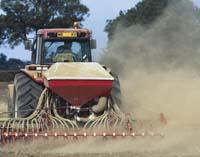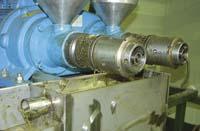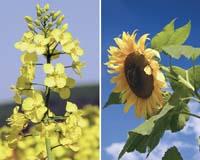Biodiesel self-production

Austrian and German baserritarras cultivate tomato, peppers, potato, leeks, etc. in their lands, both for home and for sale. Sunflower and rapeseed grow to produce fuel. This fuel is used in farm tractors and agricultural machinery. They solve their problem with oil supply. In addition, although the price of diesel rises, they have no reason for concern.
Technicians from Itsasmendikoi and Neiker-Tecnalia, during a visit last year to Austria, pressed sunflower or rapeseed crops in wineries and knew the system to use the oil obtained as fuel for agricultural machinery, from the hand of their farmers. With this system, crops grown by farmers can become fuel for machines. Oils can be extracted from seeds and fruits of various oilseeds, with about 300 species. However, the most used are rapeseed, sunflower, soy and palm. Many Austrian and German baserritarras have already opted for this system of self-supply. It is a future option for the agricultural sector of the Basque Country: planting a sunflower or rapeseed crop that, instead of selling it, will be ground in a press. Thus, for every kilo of sunflower or pressed rapeseed in lagares one third of oil is obtained that can be used as fuel of the machines.
Crude vegetable oil
In the lands of Neiker-Tecnalia and Itsasmendikoi (IMK) of Arkaute approximately 20 hectares of rapeseed are planted. The seed is sown in September and collected in late July. The harvest is stored in silos before processing. The seed is then sent to the press, where the oil and cake are extracted (the excess sunflower and rapeseed extracted from the press). 1,000 kg of oil per hectare and 2,000 kg of cakes are obtained. Therefore, 20,000 litres of oil and 40,000 kg of cake are obtained in these 20 hectares. To get a liter of oil you need three kilograms of sunflower or rapeseed.

The oil is collected in the decanter that is placed at the bottom of the press. Let stand for a month so that impurities break. Then the oil is passed to the container definitively. This container has a flow meter to measure and control the consumption of vehicles using this fuel.
In this way, the farmer uses the oil as fuel for the machines and the surplus of sunflower and rapeseed (cake) extracted from the press can be used or sold as food for the cattle (pigs, sheep, cows). This cake is a food rich in protein and high energy value: 15% oil and 30% protein approximately. However, it cannot be stored for a long time, as it loses the alimentability. Therefore, cakes are sent to feed factories approximately every fifteen days.
Experts believe that this system can be profitable in Navarre, Alava and Bizkaia. Many European farmers have already started it. However, this system forces farmers to make previous investments. In fact, in order to operate with this type of fuel it is necessary to adapt the engines of the machines.
Vehicles run on diesel and vegetable oil. It is advisable to start the engine with diesel and replace this fuel with vegetable oil when the operating temperature of the engine is adequate. At room temperature, the viscosity of the oil is high and it would take a long time to start. In the event of prolonged engine shutdown, or when the engine is expected to cool down before the vehicle starts again, the oil in the power supply system will be replaced by diesel. To make this change a switch is activated manually.

However, it has advantages such as that each press or press can be used by several farmers at once, distributing expenses. It also increases soil biodiversity, along with farmers' harvest.
Strong drive for biofuels. More and more biofuel plants are being created and more and more European farmers are planting seeds for biofuels. Given the decline in agriculture in recent years, biodiesel could be a way to create new markets, income and jobs. Although the project or system remains a pioneer in the Basque Country, experts hope that in the future it can bear fruit.





